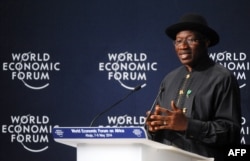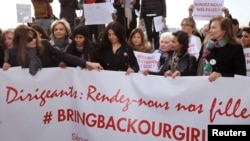Nigerian President Goodluck Jonathan pledged on Thursday to find more than 200 schoolgirls abducted by Islamist rebels, as the hostage crisis overshadowed his opening address to a major conference designed to showcase investment opportunities in Africa's biggest economy.
Speaking at the World Economic Forum (WEF) being hosted in the capital Abuja, Jonathan thanked foreign nations including the United States, Britain, France and China for their support in trying to rescue the girls, who were kidnapped from a secondary school on April 14 by the Islamic militant group Boko Haram.
U.S. First Lady Michelle Obama showed her support for the kidnapped girls on social media, posting a picture of herself on Facebook and Twitter, along with a message saying her thoughts and prayers were with the girls and their families.
Former Secretary of State Hillary Clinton also lent her voice to the international outcry.
On Wednesday Clinton expressed her outrage and called for action.
"It's criminal. It's an act of terrorism and it really merits the fullest response possible. First and foremost from the government of Nigeria,” Clinton said.
In remarks during the WEFA summit, President Jonathan thanked delegates for coming despite the danger posed by the militants, then quickly moved on to a speech about creating jobs in African economies.
“As a nation we are facing attack from terrorism,'' Jonathan told delegates. "I believe that the kidnap of these girls will be the beginning of the end of terrorism in Nigeria.”
Despite such pledges, Jonathan admitted on national television this week that he had no idea where the girls were.
The recent kidnappings and numerous other attacks by Boko Haram have overshadowed Nigeria's hosting of the forum, an annual gathering of the rich and powerful that replicates the one in Davos, Switzerland.
Foreign aid
The U.S. military said Wednesday that U.S. advisers would arrive within days to help with communications, logistics and intelligence. Britain has promised to provide satellite imagery, while France says it will send security agents. China and Canada became the latest nations to offer help on Thursday.
In the latest big Islamist attack in Nigeria, 125 people were killed on Monday when gunmen rampaged through a town in the northeast near the Cameroon border.
A senator from Borno state, Ahmed Zannah, put the number killed at 300, although local politicians have sometimes been accused of exaggerating casualty figures for political reasons.
Either way, the scale and ferocity of the massacre in Gamburu again underscored how far Nigerian security forces are from protecting civilians in an increasingly violent region.
On Tuesday, residents of another village in the remote northeastern area where the schoolgirls were kidnapped said another eight girls were seized by suspected members of Boko Haram.
Muslim scholars speak out
Top religious scholars working under the world's largest bloc of Islamic countries also said Thursday they strongly condemn the kidnappings and called for the girls' immediate release.
Nigerian Women March for Rescue of Chibok Girls
Boko Haram's leader has used Islamic teachings as justification for threatening to sell the girls into slavery.
The Islamic Fiqh Academy, which is based in Saudi Arabia and dedicated to the advanced study of Islam, said that this "crime and other crimes committed by the likes of these extremist organizations contradicts all humanitarian principles and moral values and violates the provisions of the Quran and Sunnah," or teachings of the Prophet Muhammad.
The academy is part of the Organization of Islamic Cooperation, which is comprised of some 57 Muslim majority member-nations.
Also on Thursday, the OIC's Independent Permanent Human Rights Commission said Boko Haram is misguided to claim that the abduction of the girls and the threat to sell them off as slaves is in conformity with the injunctions of Islam. The rights body described the abduction of the schoolgirls as a "barbaric act."
Nigerian police on Wednesday offered a $300,000 reward for “credible” information leading to the location and rescue of the students.
Some information for this report provided by Reuters. AP.
Speaking at the World Economic Forum (WEF) being hosted in the capital Abuja, Jonathan thanked foreign nations including the United States, Britain, France and China for their support in trying to rescue the girls, who were kidnapped from a secondary school on April 14 by the Islamic militant group Boko Haram.
U.S. First Lady Michelle Obama showed her support for the kidnapped girls on social media, posting a picture of herself on Facebook and Twitter, along with a message saying her thoughts and prayers were with the girls and their families.
Former Secretary of State Hillary Clinton also lent her voice to the international outcry.
On Wednesday Clinton expressed her outrage and called for action.
"It's criminal. It's an act of terrorism and it really merits the fullest response possible. First and foremost from the government of Nigeria,” Clinton said.
In remarks during the WEFA summit, President Jonathan thanked delegates for coming despite the danger posed by the militants, then quickly moved on to a speech about creating jobs in African economies.
“As a nation we are facing attack from terrorism,'' Jonathan told delegates. "I believe that the kidnap of these girls will be the beginning of the end of terrorism in Nigeria.”
Despite such pledges, Jonathan admitted on national television this week that he had no idea where the girls were.
The recent kidnappings and numerous other attacks by Boko Haram have overshadowed Nigeria's hosting of the forum, an annual gathering of the rich and powerful that replicates the one in Davos, Switzerland.
Foreign aid
The U.S. military said Wednesday that U.S. advisers would arrive within days to help with communications, logistics and intelligence. Britain has promised to provide satellite imagery, while France says it will send security agents. China and Canada became the latest nations to offer help on Thursday.
In the latest big Islamist attack in Nigeria, 125 people were killed on Monday when gunmen rampaged through a town in the northeast near the Cameroon border.
A senator from Borno state, Ahmed Zannah, put the number killed at 300, although local politicians have sometimes been accused of exaggerating casualty figures for political reasons.
Either way, the scale and ferocity of the massacre in Gamburu again underscored how far Nigerian security forces are from protecting civilians in an increasingly violent region.
On Tuesday, residents of another village in the remote northeastern area where the schoolgirls were kidnapped said another eight girls were seized by suspected members of Boko Haram.
Muslim scholars speak out
Top religious scholars working under the world's largest bloc of Islamic countries also said Thursday they strongly condemn the kidnappings and called for the girls' immediate release.
Nigerian Women March for Rescue of Chibok Girls
Boko Haram's leader has used Islamic teachings as justification for threatening to sell the girls into slavery.
The Islamic Fiqh Academy, which is based in Saudi Arabia and dedicated to the advanced study of Islam, said that this "crime and other crimes committed by the likes of these extremist organizations contradicts all humanitarian principles and moral values and violates the provisions of the Quran and Sunnah," or teachings of the Prophet Muhammad.
The academy is part of the Organization of Islamic Cooperation, which is comprised of some 57 Muslim majority member-nations.
Also on Thursday, the OIC's Independent Permanent Human Rights Commission said Boko Haram is misguided to claim that the abduction of the girls and the threat to sell them off as slaves is in conformity with the injunctions of Islam. The rights body described the abduction of the schoolgirls as a "barbaric act."
Nigerian police on Wednesday offered a $300,000 reward for “credible” information leading to the location and rescue of the students.
Some information for this report provided by Reuters. AP.
A yi hakuri, babu wannan abinda ake nema yanzu a shafin nan






